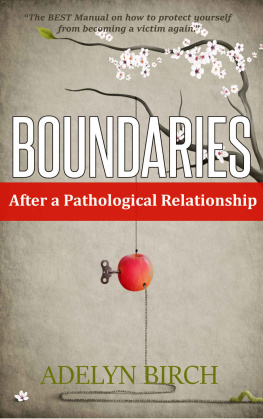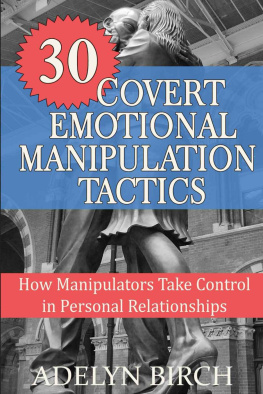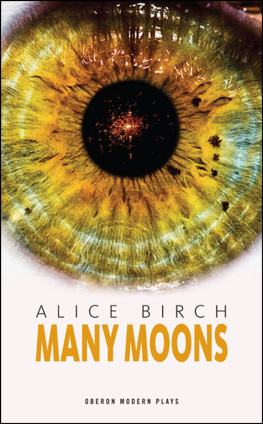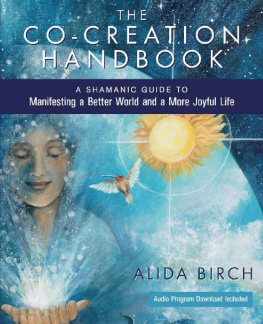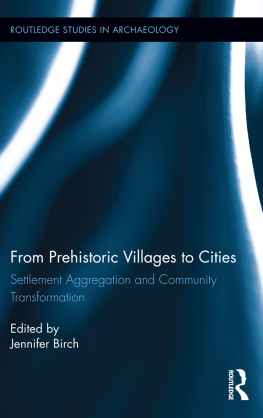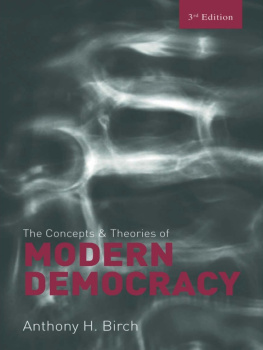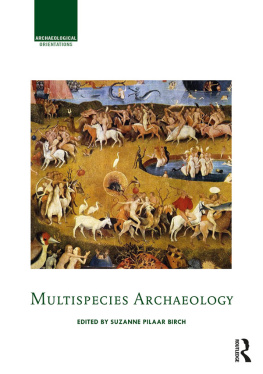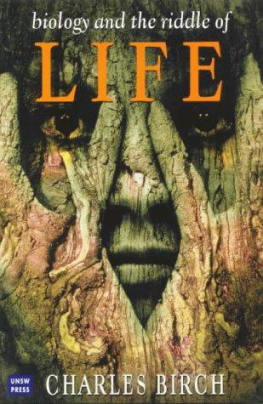Adelyn Birch - Boundaries After a Pathological Relationship
Here you can read online Adelyn Birch - Boundaries After a Pathological Relationship full text of the book (entire story) in english for free. Download pdf and epub, get meaning, cover and reviews about this ebook. year: 2014, genre: Home and family. Description of the work, (preface) as well as reviews are available. Best literature library LitArk.com created for fans of good reading and offers a wide selection of genres:
Romance novel
Science fiction
Adventure
Detective
Science
History
Home and family
Prose
Art
Politics
Computer
Non-fiction
Religion
Business
Children
Humor
Choose a favorite category and find really read worthwhile books. Enjoy immersion in the world of imagination, feel the emotions of the characters or learn something new for yourself, make an fascinating discovery.
- Book:Boundaries After a Pathological Relationship
- Author:
- Genre:
- Year:2014
- Rating:3 / 5
- Favourites:Add to favourites
- Your mark:
- 60
- 1
- 2
- 3
- 4
- 5
Boundaries After a Pathological Relationship: summary, description and annotation
We offer to read an annotation, description, summary or preface (depends on what the author of the book "Boundaries After a Pathological Relationship" wrote himself). If you haven't found the necessary information about the book — write in the comments, we will try to find it.
Adelyn Birch: author's other books
Who wrote Boundaries After a Pathological Relationship? Find out the surname, the name of the author of the book and a list of all author's works by series.
Boundaries After a Pathological Relationship — read online for free the complete book (whole text) full work
Below is the text of the book, divided by pages. System saving the place of the last page read, allows you to conveniently read the book "Boundaries After a Pathological Relationship" online for free, without having to search again every time where you left off. Put a bookmark, and you can go to the page where you finished reading at any time.
Font size:
Interval:
Bookmark:
BOUNDARIES
After A Pathological Relationship
ADELYN BIRCH
2014 ADELYN BIRCH
All rights reserved.
No parts of this publication may be reproduced, stored in a retrieval system, or transmitted, in any form or by any means, electronic, mechanical, photocopying, recording, or otherwise, without the prior permission of the author.
DEDICATION
To all those ready to fly toward freedom.
Let's soar.
CONTENTS

Life is very different after a pathological relationship. If you have experienced one, you've endured profound anguish, and have gone through profound change. It probably feels as if you need to learn all over again how to deal with others and with life.
If you haven't yet been involved in an abusive relationship, you are likely reading this book to learn how to prevent it from happening. That's wise. Abuse usually begins insidiously and worsens as a relationship progresses. Abusers gradually wear down their victim's boundaries, and as a result the victim tolerates violations they never would have before.
Abuse includes a wide range of actions and behaviors toward another that undermine their physical or emotional safety. Abusers try to make their partner feel less than to diminish their self-worth, in order to gain power and control.
Abuse can take many forms. It always involves a boundary violation, although every boundary violation is not necessarily abuse.
Physical abuse includes acts of violence that cause physical harm or injury.
Sexual abuse includes sexual exploitation or forced participation in sexual activity that is unwanted, unsafe or degrading.
Emotional abuse diminishes self-worth and self-esteem. This is done in two ways. One is through verbal abuse, which includes name-calling, habitual criticism, insulting, yelling and shaming. The other is through the use of underhanded emotional manipulations tactics the victim isn't aware of. It is the covert and intentional infliction of psychological harm.
How can you tell if you're a victim of covert emotional abuse if victims aren't even aware it's going on? There is a list of 19 signs at the end of this chapter that will help you figure it out.
Financial abuse includes controlling access to money, taking a victim's money through theft or deceit, or preventing a victim from earning an income.
Social abuse includes limiting access to friends and family or completely isolating the victim, and preventing a victim from going to school or other outside activities.
Abusers may use intimidation and threats as well. They may threaten to hurt themselves, their victim or the family. They may destroy things, damage personal possessions or harm pets.
Abusers tend to be jealous, possessive, dominant and controlling.
Abuse is often carried out consciously on the part of the abuser, but can also be unintentional due to limitations in the abusers insight, understanding or ability to behave differently. But that doesnt mean you should accept it or accept excuses for it. Never try to figure out what an abuser's intentions are; all that matters is the presence of the abusive acts themselves and the effects they have on you. You do not have any obligation to be abused by anyone, no matter what their problem is.
According to George Simon, PhD, psychologist and expert in disturbances of personality and character, "Universally, one-time victims of abusive relationships I counseled began to report an increased sense of personal power and validation once they stopped trying to second-guess why the person mistreating them was doing what they were doing and started holding them accountable for the behavior itself. To do so, they had to stop musing about whether the other person did or did not truly intend to hurt them. In the process, they also became aware of how naturally hesitant they were to ascribe malevolent intentions to others and to seek other more palatable explanations for behavior."
If you have been in an abusive relationship, the time comes when you start to look beyond the trauma you experienced. You don't want to let what happened hold you back from living your life anymore. You may even feel ready to take a chance at love again.
At the same time, the thought of dating probably makes you nervous. It's not the carefree thing it used to be. In the past, you never met someone you were interested in and wondered if they might be an abuser. You're wiser now. But you're also wise enough to know that it can be impossible to see the truth about someone in the beginning of a relationship. That thought is unnerving, because you don't want to be victimized again. You wonder what you can do to protect yourself.
After a traumatic relationship ends, its not unusual to feel vulnerable and need to regroup. You may have withdrawn for a while to figure things out. Now you're feeling ready to venture out into the world again, even though your confidence is still a shaky.
To build your confidence, develop personal boundaries before getting involved in new relationships. Boundaries, combined with your experience and knowledge, can help you avoid becoming involved in another pathological relationship.
A big part of confidence comes from boundaries, because they can make it possible to connect with others while maintaining your safety and your integrity. When you have boundaries, your fear will diminish significantly. You will feel empowered because your boundaries will enable you to communicate your self-worth to others. The more you practice upholding your boundaries, the more respect, love and support you will have in your life.
Boundaries protect your emotional and physical health, and they protect you from the behavior and demands of others. They allow you to confidently express who you are and what you want. Boundaries help you live your life the way you want to live it.
As important as boundaries are, though, theyre just one part of preparing yourself for new relationships. Know your weak spots and learn how they can make you vulnerable. Value yourself. Feel your worth. Know what you want from life and from relationships. Learn the facts about psychological manipulation. Learn the warning signs that tell you that you might have an abuser on your hands. Learn how the mind works, and how that makes us vulnerable to abusers and predators. And learn how their minds work, too.
Although boundaries will build your confidence and improve your life and relationships, they will not automatically get rid of the limiting beliefs that caused you to have weak boundaries in the first place. You may need a good counselor to help you identify and challenge those beliefs before you're ready for new relationships.
Become Your Own Protector
There comes a time when you must learn to be your own protector, your own advocate and your own best friend. You may have already been through the trauma of being victimized by an abuser, and you realize changes are needed. The time has come to recognize your wisdom and put it to use in your life. Be willing to learn from your experience and to accept the world as it is, flaws and all. That can give you the knowledge and the clear-eyed view you need to act wisely on your own behalf.
Wanting to make changes doesn't mean there was anything wrong with you before, or that it was your fault you were victimized. It simply acknowledges the fact that there are people in this world who don't have our best interests at heart and who will gladly take advantage of us. Thats reality, as we know all too well. The world isnt the way we want it to be it is the way it is. It's up to us to find a way to deal with that. It's up to us to protect ourselves, as best we can. We are worth protecting. We are the ones who need to have our own best interest at heart.
Font size:
Interval:
Bookmark:
Similar books «Boundaries After a Pathological Relationship»
Look at similar books to Boundaries After a Pathological Relationship. We have selected literature similar in name and meaning in the hope of providing readers with more options to find new, interesting, not yet read works.
Discussion, reviews of the book Boundaries After a Pathological Relationship and just readers' own opinions. Leave your comments, write what you think about the work, its meaning or the main characters. Specify what exactly you liked and what you didn't like, and why you think so.

